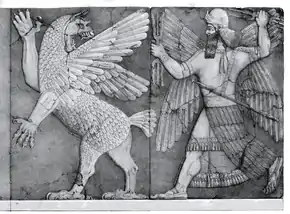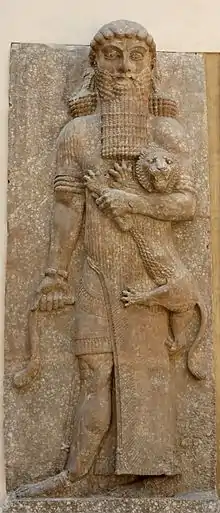Siduri
Siduri is a character in the Epic of Gilgamesh. She is an "alewife", a wise female divinity associated with fermentation (specifically beer[1] and wine[2]).
| Part of a series on |
| Ancient Mesopotamian religion |
|---|
 Chaos Monster and Sun God |
| Related topics |
Role in the Epic of Gilgamesh
In the earlier Old Babylonian version of the Epic, she attempts to dissuade Gilgamesh in his quest for immortality, urging him to be content with the simple pleasures of life.[3][4]
Later influence
Several scholars suggest direct borrowing of Siduri's advice by the author of Ecclesiastes.[5] The advice given by Siduri has been seen as the first expression of the concept of carpe diem, although some scholars see it as urging Gilgamesh to abandon his mourning, "reversing the liminal rituals of mourning and returning to the normal and normative behaviors of Mesopotamian society."[6][7]
Siduri has been compared to the Odyssey's Circe. Like Odysseus, Gilgamesh receives directions on how to reach his destination from a divine helper. In this case it is the goddess Siduri, who, like Circe, dwells by the sea at the ends of the earth. Her home is also associated with the sun: Gilgamesh reaches Siduri's house by passing through a tunnel underneath Mount Mashu, the high mountain from which the sun comes into the sky. West argues that the similarity of Odysseus's and Gilgamesh's journeys to the edges of the earth are the result of the influence of the Gilgamesh epic upon the Odyssey.[8]
Siduri's name means "young woman" in Hurrian and may be an epithet of Ishtar.[9]
References
- Hartman, L. F. and Oppenheim, A. L., (1950) Supplement to the Journal of the American Oriental Society, 10.
- Sandars, N. (1960). The Epic of Gilgamesh. Penguin Books Ltd, London, England. ISBN 978-0140441000.
- Ackerman, Susan (2005). When Heroes Love: The Ambiguity of Eros in the Stories of Gilgamesh and David. Columbia University Press. pp. 130–131. ISBN 978-0231132602.
- George, A.R. (2003). The Babylonian Gilgamesh Epic: Introduction, Critical Edition and Cuneiform Texts. Oxford University Press. p. 498. ISBN 978-0198149224.
- e.g. Van Der Torn, Karel, "Did Ecclesiastes copy Gilgamesh?", BR, 16/1 (Feb 2000), pp. 22ff
- Ackerman, Susan (2005). When Heroes Love: The Ambiguity of Eros in the Stories of Gilgamesh and David. Columbia University Press. pp. 130–131. ISBN 978-0231132602.
- Perdue, Leo G. (2009). Scribes, Sages, and Seers: The Sage in the Eastern Mediterranean World: The Sage in the Mediterranean World. Vandenhoeck & Ruprecht GmbH & Co KG. p. 57. ISBN 978-3525530832.
- West, Martin. The East Face of Helicon: West Asiatic Elements in Greek Poetry and Myth. (Oxford 1997) 402-417.
- Abusch, T. (1993) Gilgamesh's Request and Siduri's Denial. Part I: The Meaning of the Dialogue and Its Implications for the History of the Epic. The Tablet and the Scroll; Near Eastern Studies in Honor of William W. Hallo, 1–14.
